
Romantic comedies are usually about when love works.






The words of Zooey Deschanel—“Romantic comedies are usually about when love works.”—are simple, yet they carry a depth that echoes across the ages. She speaks here of a truth that art has long pursued: the longing not merely to tell stories of despair, but to celebrate the moments when love triumphs, when two souls find harmony, when laughter and tenderness overcome the trials of life. In this short reflection, she reveals the essence of an entire genre, a truth that contrasts with the tragedies and epics that so often remind us of love’s fragility.
To say that romantic comedies are about “when love works” is to distinguish them from the many other stories humanity tells about love. The ancient plays of Sophocles and Euripides warned us of passion’s dangers—love leading to ruin, to jealousy, to destruction. The great tragedies of Shakespeare, like Romeo and Juliet or Othello, remind us of how easily love may falter, betrayed by fate or human weakness. But the romantic comedy dares to present a different vision: not love undone by chaos, but love fulfilled, resilient enough to stand the test of conflict and misunderstanding, emerging with joy.
This is not to say such stories are naïve. Within them, obstacles abound—miscommunication, rivalry, distance, pride, or folly. Yet the difference lies in the resolution. Where the tragic love story ends in separation or sorrow, the romantic comedy finds a path back to unity. It insists that love can work, that laughter and tenderness are weapons against despair, and that human beings are capable of harmony. In this, Deschanel touches a truth long yearned for by the human heart: that stories of love’s success are just as necessary as those of its failure.
History offers many examples of this truth made flesh. Consider the marriage of Elizabeth Barrett Browning and Robert Browning, poets whose love defied the opposition of her family and the frailty of her health. Though their story was not free from hardship, it endured, giving rise to some of the most luminous poetry in the English language. Their bond was not tragedy but triumph, a real-life example of “when love works.” Their words still echo across the centuries, living proof that the vision captured in romantic comedies is no mere fantasy but a possibility rooted in human life.
The meaning of Deschanel’s statement reaches beyond film and into the heart of how we live. The world often shows us the failures of love—broken vows, lost passion, fractured families. Yet to remember and celebrate the times “when love works” is vital to the survival of hope. Romantic comedies are not just entertainment; they are reminders, symbols of resilience, whispers to the weary that love can endure, and even flourish, despite imperfection.
The lesson for us is that we must not grow cynical. To dream of love working, to believe in its possibility, is not weakness but strength. It is easy to believe only in tragedy, for the world is full of examples. Harder, and braver, is to believe that joy, companionship, and unity are real. Thus, we must cultivate stories of hope in our own lives: not ignoring conflict, but choosing to resolve it; not fleeing at the first sign of trouble, but laboring toward reconciliation.
Practically, this means treating relationships as living stories. Ask yourself: How do I write my comedy rather than my tragedy? Learn to laugh at small conflicts. Learn to forgive quickly. Celebrate the quirks and imperfections that, when embraced, make love not only bearable but joyful. In doing so, we embody what Deschanel describes—we live out the stories where love does not collapse, but works, endures, and delights.
Thus, the words of Zooey Deschanel shine with quiet wisdom. Romantic comedies remind us that love, though often difficult, is not doomed. It can succeed, it can last, it can even bring joy. This is the truth she offers for generations: let us honor not only the sorrows of love but also its victories, for in remembering that love can work, we keep alive the hope that sustains the human spirit.






AAdministratorAdministrator
Welcome, honored guests. Please leave a comment, we will respond soon